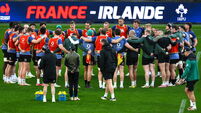Time to end latched-door mentality in Rebel County
Eight days out from that year’s Munster final, Cork had held an A versus B game in Páirc Uí Chaoimh. I was down there hoping to catch a few words afterwards with the management and as we waited in the tunnel, Steven O’Brien hobbled past, gear bag over his shoulder. Back then, only 24 players could be included on an inter-county panel and O’Brien hadn’t been included for the following week’s showdown with Kerry. Instead he would watch that game from the stands, just as he’d famously watch that year’s All-Ireland final defeat to Meath.
He was in good company. Damien O’Neill began that championship as Cork captain, but soon picked up an injury, forcing him not just to forsake the captaincy but his place on the panel. By September both players would have been fit and offered Cork desperately-needed leadership and no little football, but this was a time when the GPA was literally only a wet week old and the idea of 30-man panels was fantastical. Teams and county boards saw no further than the next game and the 24 picked for it.












